Theater
Underage gender identity is a family matter in ‘A Kid Like Jake’
It’s no longer safe to assume this show will be welcomed with open arms
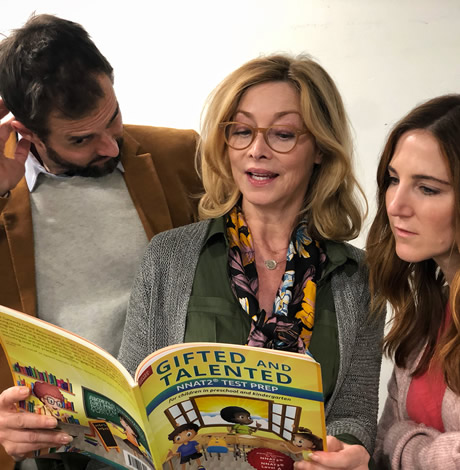
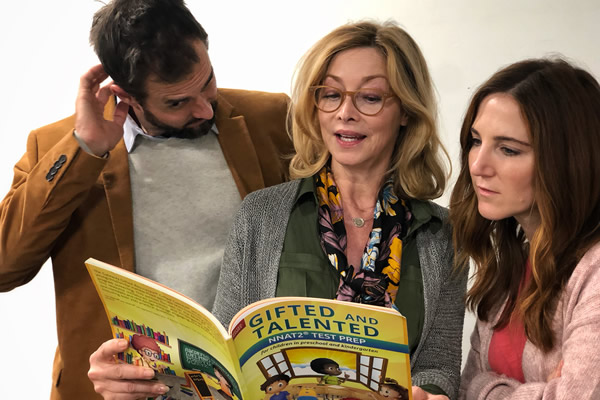
‘A Kid Like Jake’ continues its Pasadena Playhouse run through Nov. 3. (Photo by Adam Shapiro)
When Daniel Pearle’s “A Kid Like Jake” was first performed in 2013, the world was a very different place.
Early in the second term of the Obama administration, the play – about two young Brooklyn parents grappling with the possibility that their 4-year-old son’s fondness for playing dress-up might be an early attempt at alternative gender expression – was met by a progressive and open-minded cultural climate that was ready and willing to welcome it into the growing public conversation about gender identity.
Nevertheless, six years after its debut, as Pearle’s re-tooled version is poised to make its West Coast premiere in an IAMA Theatre Company guest production at the Pasadena Playhouse, it’s no longer safe to assume the show will be welcomed with open arms.
That’s not because understanding about gender dysphoria has evolved, although it certainly has; the playwright himself has commented that when he first wrote the script, “it was before ‘Transparent,’ before Caitlyn Jenner and Laverne Cox, before ‘gender expansiveness’ was part of our cultural lexicon.” The changing landscape around the subject, however, was always part of the dynamic that made the play tick, and the rewrites undertaken by Pearle after his work on the film version (which debuted at Sundance in 2018 and went on to a limited theatrical run) presumably bring the conversation up to date for a new production.
What makes its reception an uncertain proposition is the shift that in the culture since 2016, the regressive backlash from conservatives that has reminded us that the struggle for LGBTQ acceptance – especially with regard to trans and other gender non-conforming individuals – is a long way from being over.
Discussion about the issue becomes particularly virulent when it relates, as it does in Pearle’s play, to someone who is underage.
Consider, for example, the case of Desmond Napoles, better known as “Desmond Is Amazing,” the now-11-year-old drag performer who has been in the public eye since an appearance at 6 in a Jinkx Monsoon music video. Identifying as gay and genderfluid, Desmond has gone beyond the fame of his popular Instagram presence and his public performances to become a widely recognized advocate and spokesperson for LGBTQ issues. Yet he has also been met with criticism from social conservatives, who claim that his supportive parents are “sexualizing and exploiting” a minor. Social media is rife with other such cases, where online bullying and even death threats are a daily occurrence, arising from the kind of outdated thinking that conflates gender identity with sexuality, and being queer with pedophilia.
With that kind of heated tempest as part of the social backdrop, it’s easy to imagine that “A Kid Like Jake,” might be returning into a political firestorm of its own. Yet according to director Jennifer Chambers, speaking to the Blade in advance of the show’s October 3 opening, it’s a play that slips past the political to focus on the personal.
“The play is about Jake, but it’s also not,” she explains. “We never see Jake, at all. He’s talked about, but he never appears onstage as an actual character. It’s about his parents, and how they work out where they are with their son.”
She elaborates. “They are considering getting him into special programs for kindergarten, and as they’re going through the school application process, things start being revealed about who he is, or who he might be. It becomes a discovery about gender identity, and how as parents… when you think things are one way, and your child is finding their own self and their own voice… how as parents, you navigate that. And then when that hits upon your old belief systems, your old ways of thinking, how that affects your relationship with your son, and your marriage, and how you navigate through that.”
Reflecting on how the play handles the situation, Chambers adds, “I think these parents really begin from a place of ‘we’re doing absolutely the best things for our son, we know what’s best for our kid and we’re making exactly the right decisions for him’ – and then as things progress, as things get to revealed, that gets called into question. There are the older blind spots, and biases – fears, really – about who your kid is, or might be, and about how because of it he… or she or they… is not safe. You want to protect your kid, but you also need to allow my kid to be who they are. It’s really all about the parents’ journey, and how they open up and fall apart and get put back together inside of that conversation.”
As for many of the hot button-issues surrounding young people who grapple with their gender identity – the prejudice, the bullying, the sexualization – the director says the play doesn’t really go there. “We do touch on a few of those boundaries, of where, inside of our biases, we might go; Alex, the mom, out of her own fear, out of her sense of feeling the ground being pulled out from under her feet – there’s a time when she says things that, if she were thinking and were not fueled by that fear, she would absolutely never say. It touches into that – but otherwise no, it’s very much contained inside the family, and inside of the process of just applying to kindergarten.”
By keeping the focus squarely on the people directly involved in the process of discovery depicted in the play, “Jake” keeps the situation free from the complications imposed by a larger world, allowing its characters to explore the limits of their own boundaries – a process that is complicated enough on its own. It’s this breaking down of what has become a public issue into the private, the setting of the conflict in an intimate arena instead of a social one, that made Chambers – who is herself the mother of two children, seven and nine – want to jump at the chance to direct this new production.
“More than anything I really love Daniel’s writing,” she says, “I love his rhythms, I love his humor. But also, I’m a parent, myself, and my kids are growing. It’s a process – how you support your kids, when they’re your babies and they’re so much a part of who you are, and then they grow and they differentiate. It’s brutal, and it’s beautiful, and it’s heartbreaking – and I don’t think there’s an easy way to navigate it, as they become their own self. The essence of that is what hooked me into this and what keeps pushing me. It’s so simple and so complicated at the same time, which is what is so exciting to me.”
Given the involvement of a director with such a deeply felt personal connection to the material, working with a talented cast that includes Sharon Lawrence, Olivia Liang, Tim Peper, Sarah Utterback, “A Kid Like Jake,” is likely to carry much of that excitement to LA audiences as it continues its Pasadena Playhouse run through Nov. 3.
For performance schedule and tickets, visit iamatheatre.com.
Local
New chapter: P3 Theatre Company moves to Los Angeles
P3 Theatre Company, a long-standing staple in Long Beach’s theatre scene, has officially relocated to Los Angeles.

P3 Theatre Company, a long-standing staple in Long Beach’s theatre scene, has officially relocated to Los Angeles. While the company remains close to its Long Beach roots, this move signals a fresh chapter and opportunity to connect to a broader audience.
Jon Peterson, Executive Director and Founder of P3 Theatre Company, discusses the transition.
“After the pandemic lifted, the venue we were renting in Long Beach was no longer available to us,” explained Peterson. “After some time, we decided to look in the Greater Los Angeles area. There are so many great venues available, and there’s definitely a huge demand for the arts.”
P3 Theatre’s first major production in Los Angeles will be “Day After Day” (The Life and Music of Doris Day), a sentimental and nostalgic celebration of the legendary singer and actress. The choice to revive this show was intentional — it was P3’s last production before the Covid-19 shutdown.
“‘Day After Day ‘ was a very successful production,” said Peterson, noting that it earned Deborah Robin the Best Performer in a Musical title at the Orange County Theatre Guild Awards. “It’s such an endearing show with tons of recognizable music and the dynamic story of Doris Day.”
While dazzling performances are integral to P3’s mission, the company is equally committed to community outreach. Peterson emphasized that the move to the West Hollywood and Hollywood areas, offer opportunities to collaborate with other nonprofits and expand access to the arts for marginalized groups.
“There is a huge demand for the arts in this region,” said Peterson. “We look forward to bringing shows that audiences are excited to see, as well as introducing new works that will enhance their theatrical experience.”
One of P3’s signature initiatives is P3 Educates+, a program designed to provide performing arts workshops to underserved communities. Catering to all ages – which Peterson describes as 0-100+ – the workshops include improvisation, acting, and singing.
“It provides more than just an education of theatre,” Peterson explained. “[It provides] a level of entertainment that marginalized communities may not have an opportunity to experience otherwise.”
Supporting LGBTQ+ stories and artists is also a core priority for P3 Theatre Company. Peterson highlighted the company’s commitment to producing both new LGBTQ+ works and celebrated classics.
“Our stories need to be told and heard,” Peterson emphasized. “What better way to do so than through the arts?”
Among P3’s proudest achievements are the world premieres of two acclaimed works by playwright Jiggs Burgess. The Red Suitcase won the prestigious Del Shores Playwright Competition, while Wounded earned multiple awards at the Hollywood Fringe Festival in 2023. The latter’s success secured an off-Broadway run at Soho Playhouse in New York City, with performances continuing in 2024 and 2025.
P3 Theatre Company has ambitious long-term goals for its future in Los Angeles. Peterson hopes to build a strong audience and donor base while eventually securing a permanent performance space.
“P3 Theatre Company’s long term goal is to grow a solid audience and donor base in Los Angeles – and to find ‘the perfect theatre’ to hang our hat in.” Peterson said. “It is our plan to call Los Angeles our home and to continue to produce professional theatre in a community where theatre is thriving.”
For those eager to experience P3’s return to the stage, tickets for Day After Day (The Life and Music of Doris Day) are now available. As Peterson says with confidence, “We know the audiences will love it!”

For more information about P3, head to www.p3theatre.biz
Arts & Entertainment
GMCLA’s Rhinestone Cowboys to dazzle the stage in upcoming concert
Happening at the Saban Theatre in Beverly Hills on March 22 and March 23
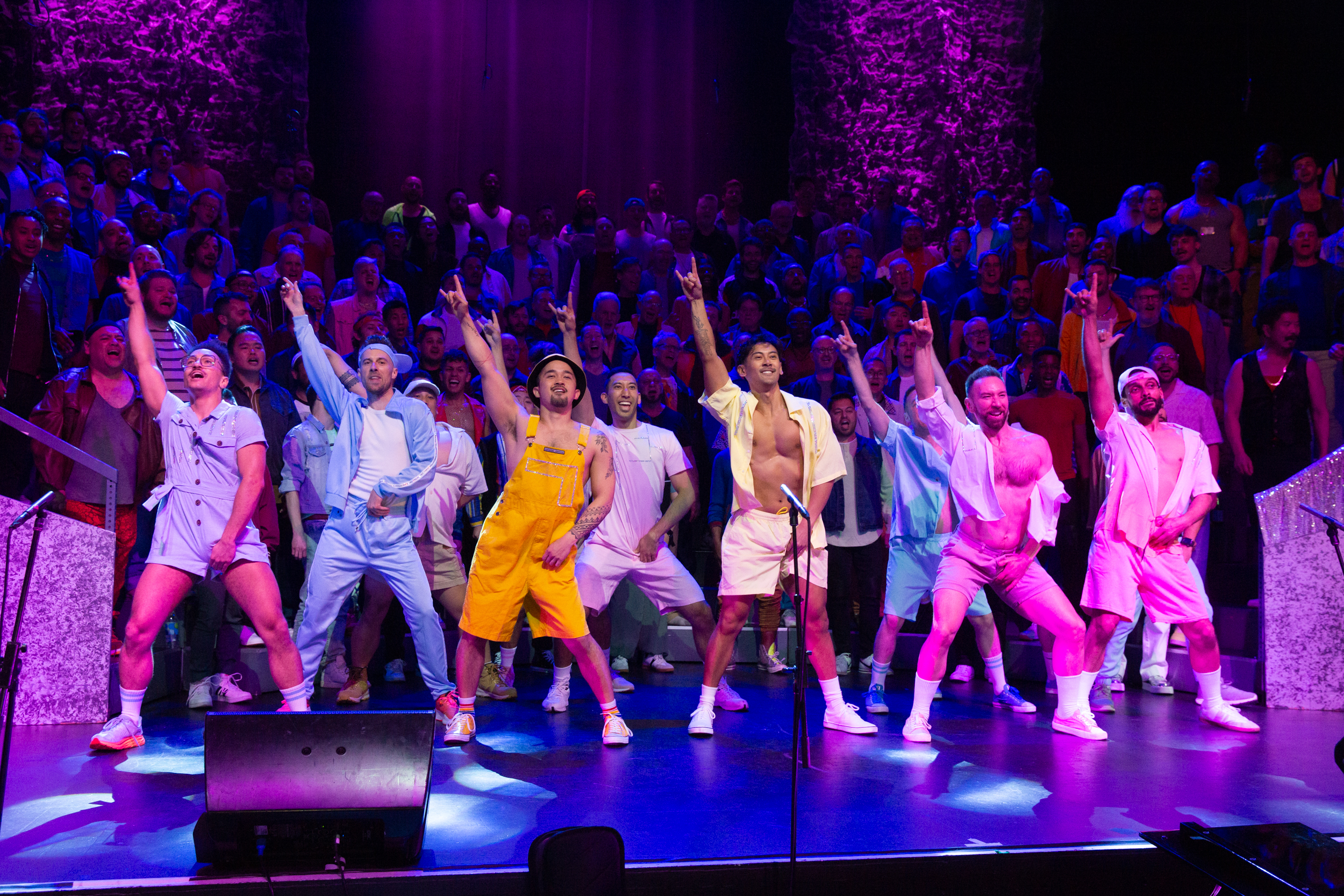
The Gay Men’s Chorus of Los Angeles is bringing the glitz and the glamour to the stage
along with 200 Chorus members dedicated toward singing and dancing to the most
revolutionary hits in country music. Not that you need one, but this is the perfect excuse
to corral the gays and gals and throw on your rhinestone-studded fits for a night of gay
magic. We know you still have the perfect articles of clothing from Beyonce’s
Renaissance Tour to make a new fit and make an appearance at the Saban.
The Rhinestone Cowboys concert will feature music by Dolly, Reba McEntire, Shania
Twain, Johnny Cash, Chris Stapleton, Taylor Swift and more.
GMCLA will also feature music by the genre’s most beloved allies and queer artists
such as Beyoncé, Brandi Carlile, Shaboozey, Lil Nas X, and Chappell Roan.
Los Angeles Blade had a chance to sit with Lou Spisto, who is the Executive Director &
Producer of GMCLA and catch up on the latest.
“Whether we do Broadway, classical, pop or disco, [the production] is going to have a
sound based on who we are and how we do what we do,” said Spisto. “It’s also going to
have our sensibility and how we sass it up and spin with just a little bit of fairy dust.”
The Rhinestone Cowboys show will feature over 200 of their over 240 members, on
stage throughout various songs – everything from the Cash classics, to the new
Beyonce hits that earned her the Grammy for Best Country Album of the Year.
Spisto was brought on as Executive Director and Producer in early 2019 after the
organization was experiencing financial trouble and began to engage the community and the organization in a fiscal turnaround by going directly to the public, even from the
stage, asking for donations from community, subscribers and the corporate sector. The
turnaround was successfully completed by the end of 2019 and months later COVID-19
forced the shutdown that all the world experienced.
Shortly after GMCLA ‘righted the ship,’ Spisto said, “COVID-19 shut us down and
thankfully, by then, we had enough financial stability to withstand what we may not have
been able to do at that time.”
“Since 2019 and then after the pandemic again, we’ve grown much stronger ,” said
Spisto. “And then COVID-19 happened before the fourth production.” Spisto credits the LA Arts Recovery Fund for giving them the critical support to keep the
organization going through the shutdown and be able to bring the Chorus back.
Four years after the pandemic shut down, Broadway and non-profit theatres are still
struggling to see pre-pandemic attendance levels. Which means, GMCLA is beating the
odds and keeping productions running during times where audience shifts, soaring
prices on everyday items and other issues, limit attendance.
According to a broader arts industry analysis, ‘the last full season before the COVID-19
industry shutdown – the 2018 to 2019 season – saw historic highs in both earnings and
artist work weeks.’ By contrast and because of COVID-19, the ‘2020 to 2021 earnings
and total work weeks dropped to a historic low.’ The latest in the analysis of 2023 to
2024 shows the nation’s theatre productions just beginning to recover from the
pandemic drop in live performances and audience attendance.
GMCLA plans upcoming productions that take over 12 weeks each to rehearse and
produce while it also performs many free community events and school programs . “We
are financially stronger, and that means we have the ability to give back to the
community as well,” said Spisto.
GMCLA recently hosted an event at The Abbey Weho that brought together the community and raised over $7,000 dollars for those who were impacted by the fires that devastated neighborhoods in Los Angeles back in January.
This is just one of the many ways that the Chorus is giving back. GMCLA continues its
work on the current season’s remaining two sets of concerts, finalizing plans for the
2025 GALA in June, creating and developing an exciting season for next year and
keeping its eyes on the 50th season in 2028 and 2029.
Arts & Entertainment
‘Old Friends’ is a must-see for Sondheim fans
Though some of the material is considered classic Broadway, it all comes off as glossy and relevant
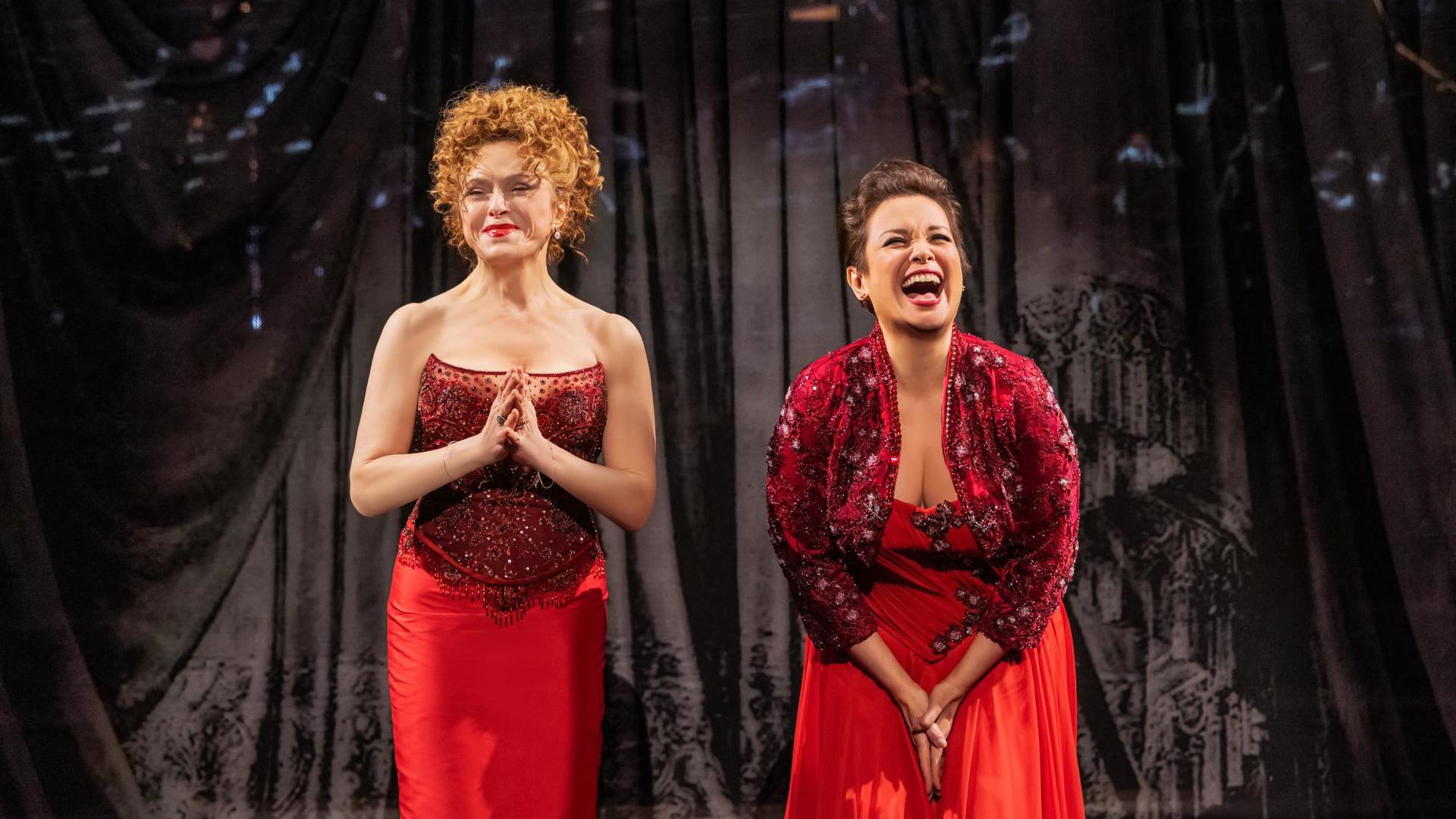
When it was announced that the Sondheim tribute Old Friends, was headed to the Ahmanson from its West End run–we the queer musical theatre nerds–went into a tizzy.
When we found out that Broadway royalty Bernadette Peters and Lea Salonga were continuing their run with the show, we just about passed out.
We were there on opening night at the Ahmanson with a star-filled audience to witness a truly five-star production where everything just fits right. The long-lasting roaring applause that met the entrance of the show’s two stars did not end and the evening took the audience on a roller coaster of emotions. This is old-school theatre excellence made fresh for today’s audience. Sondheim’s material is alive and well.
There have been musical revues of this Broadway icon before. This production fares very well by focusing on Sondheim’s collaborations with other Broadway icon Cameron Mackintosh. All of your favorites are there – Company, Into the Woods, Follies, West Side Story, Sweeney Todd, and more, with many surprises from his other shows.
Some of the musicals are presented as full sequences–and Sweeney Todd and West Side Story segments were full mini-musicals, with sets and all. Other numbers were presented with a twist, adding a fresh take that allowed the actors to shine. Though some of the material is considered classic Broadway, it all comes off as glossy and relevant.
The set, costumes, and lighting were top-notch. Quick transitions were masterfully orchestrated and the whole affair seemed made for the Ahmanson. Some traveling shows have that temporary or makeshift energy, not here. While musical theatre is often limited by budget when it comes to pit musicians, this orchestra, led by musical director Annbritt duChateau, is absolutely rich with texture and lush with sound. It gave the material the quality it deserved.
What can we say about the performers? Yes, Peters and Salonga are huge names and big personalities to lead the evening. There is not one weak player here. The cast is full of Tony Award winners and nominees–and it is obvious.
The beauty of Old Friends, is that the show gives everyone the opportunity to shine–and they take it. The chemistry of the cast is palpable and every player hands over the spotlight graciously. No one runs away with the show–they all do.
Peters, Sondheim’s main muse, continues her reign as one of Broadway’s greats. When she hits the stage, you can feel the energy and you know you are witnessing theatre royalty. Over the years her voice may have lost a little of that shine, but her emotion and pathos add a layer to the material that could never be replicated. Seeing her reprise her role as Dot in Sunday in the Park with George, is truly special.
Salonga’s voice seems to know no limits.
She skillfully masters Mrs. Lovett and brings down the curtain with her version of “Everything’s Coming Up Roses.” She may not have the emotional range as Peters, but she is the perfect lead for this show. Every other actor could have their own review, they are just that good. Special shout out to Tony Winner Beth Leavel who tore the stage apart with her take on “Ladies Who Lunch,” not an easy feat when most of us have echoes of Elaine Stritch and Patti LuPone in our minds.
She makes the material her own and the audience couldn’t get enough. Two-time Tony nominee Gavin Lee, brings the comedy and the drama to his performance, enchanting the audience with his “Could I Leave You?”
Broadway heartthrob Jacob Dickey leads a powerful and new take on “Being Alive” and also somehow makes the role of the Wolf from Into the Woods his own.
Truth be told, this winning production is best suited for Sondheim fans. I would be hesitant to take a non-theatre lover or someone who just likes movie musicals as my plus one. You don’t have to be a Sondheim aficionado, but this is a very deep dive into the material and is best appreciated by those in the know. Thank goodness there are many of us out there. What was plain to see by the audience in attendance, is how far Sondheim’s music has reached. Young, old, queer, fancy, casual, celebrity, everyone became one audience to enjoy this magical evening.
With everything going on in today’s world, it is so comforting to come home in a sense, to music that has made such an impression in our lives. There is safety in enjoying the known, like watching a TV show that you’ve binged for the umpteenth time and, in this show fraught with love and sincerity, is able to make it new again.
Old Friends plays at the Ahmanson for a limited run until March 9th before heading to Broadway. Tickets are available on the Center Theatre Group website.
Arts & Entertainment
Rogue Machine Theatre’s ‘Bacon’ probes cycles of intimacy and abuse between gay Gen Z’ers
Sophie Swithinbank’s award-winning drama about London schoolboys makes it LA debut
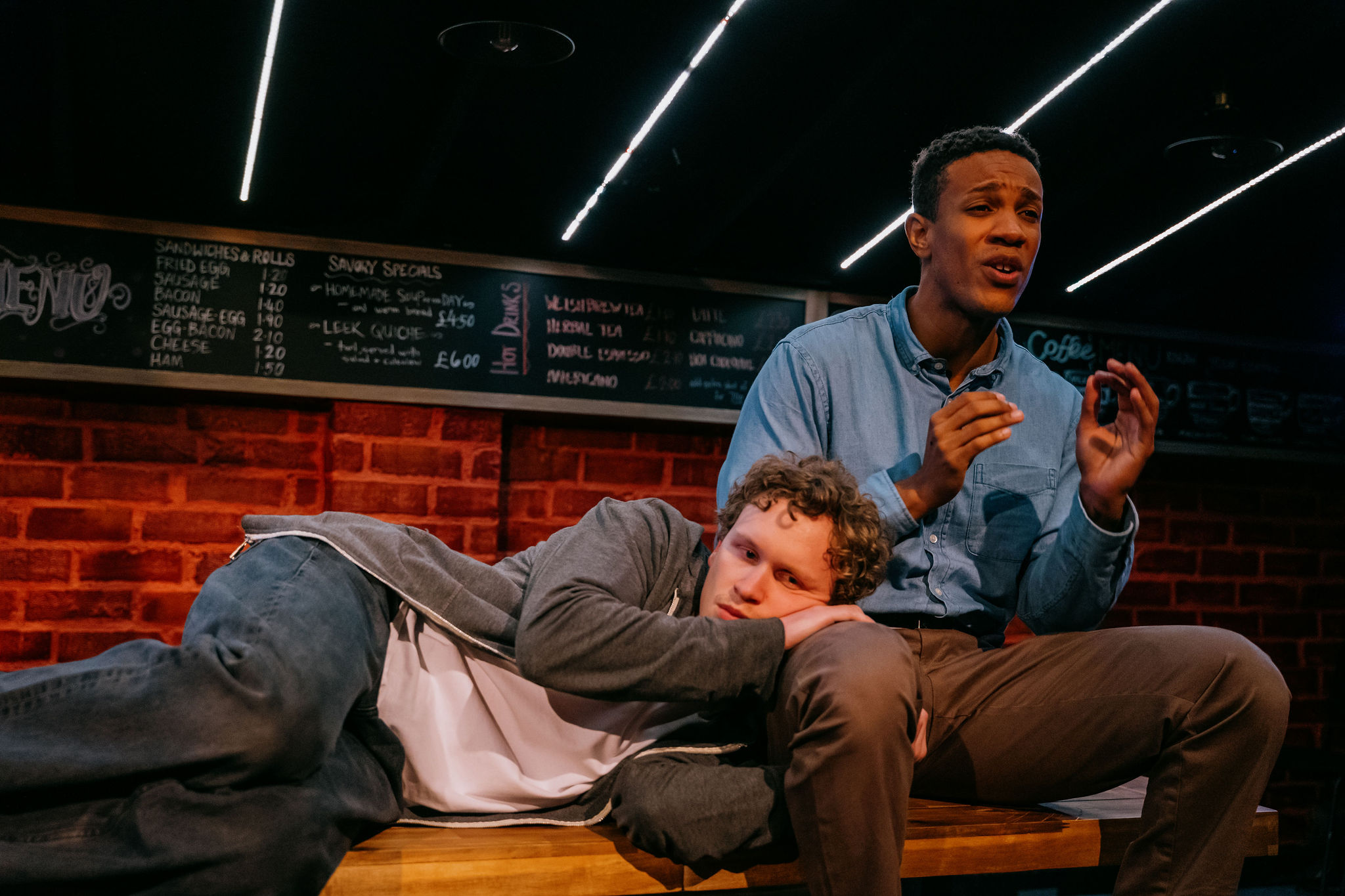
Legacies of shame and abuse play out in surprising ways in Rogue Machine Theatre’s
production of British playwright Sophie Swithinbank’s award-winning play Bacon, which follows two boys in a London high school as they form a fraught and manipulative relationship.
Rogue Machine isn’t saying much else about the play – even getting that much of log line required an email to the company’s marketing director and a referral to the play’s publisher. The company is hoping that audiences will come into the show blind and be completely surprised by what they see. So far, director Michael Matthews says the audiences who are turning up are appreciating the play’s twists and turns.
“Right before it goes to the blackout at the end of the show, there’s always a gasp, which is
always like, you got it, you’re with it,” Matthews said. “If you come see my show, I want you to
come in one way, but I want you to exit another. Even if this is a smile on your face, or like a tear or something, but to have some sort of movement. The audience is, so far from what I’ve witnessed, they’ve been along on the journey.”
Swithinbank’s own playwright’s note for the show says it’s ‘about what happens when teenagers learn to bully and humiliate each other before they learn to love,’ and that it was inspired by an act of bullying she witnessed and a toxic relationship she experienced growing up.
Matthews says when Rogue Machine approached him about directing the the play, the script gripped him from the first page, which isn’t surprising given the splash Bacon made when it debuted across the pond in 2022, earning three Off-West End Awards, and previously earning Soho Theatre’s Tony Craze Award for Playwrighting.
“It’s not just that I see myself in a play, but that my heart is pulled a certain way. That’s just me
knowing that this is something that I have to do,” Matthews said of the script.
And Swithinbank has been involved with this production as well, workshopping the script to fit it to Rogue Machine’s young cast, which features Brazilian-American actor Wesley Guimarães and Chicago native Jack Lancaster – you may have seen him on “The Bear.”
“One of actors is Brazilian, and so [Swithinbank] changed a lot of her words to add in that his
mother was Brazilian inside the play. She went so far as to put in Portuguese into the show,
which just adds on a richness that just works so beautifully. And then the other actor, his family is from Dublin, and so we changed a lot of the characterizations to have that Irish authenticity,” Matthews said.
That authenticity is essential, especially as the show is playing in Rogue Machine’s
intimate Henry Murray Stage, which seats just 37 people.
“It’s supposed to feel very intimate, like you’re walking into like some place you’re not supposed to be and you’re observing something you’re not supposed to be observing. And so you have that thing inside of you when you’re watching, like I should help. This is a foot away from me. I should do something, but you can’t, right? So it gives intimacy a whole brand new name,” Matthews said.
Bacon plays at The Matrix, 7657 Melrose Avenue, Los Angeles, CA 90046, through March 30.
Fri and Mon at 8pm, Sat-Sun at 5pm. Tickets available at The Rogue Machine Theatre site.
News
Fountain Theatre’s Alabaster presents a timely tale of love in the aftermath of disaster
‘It has this wonderful sort of straddling the fence of comedy and tragedy in the way that life does.’
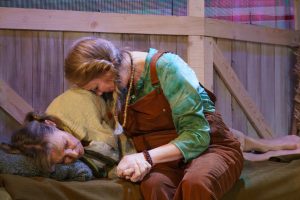
When Fountain Theatre set out to produce the Los Angeles premiere of Audrey Cefaly’s play
Alabaster, they were hoping that the all-female show about the power of art and the strength
and resilience of women would be a timely celebration of the country’s first female president.
That didn’t turn out, but in the wake of the fires that devastated Los Angeles last month, the
story – which follows a romance that blossoms when New York photographer Alice, who’s
travelled to the titular Alabama city to capture the portrait of June, a woman whose survival of a tornado has left her with physical and emotional scars – has become even more relevant.
“It’s very much a play about loss and trauma and grieving and how we process and move
forward,” says Casey Stangl, who’s directing the Fountain production. “It has this wonderful sort of straddling the fence of comedy and tragedy in the way that life does.”
And that includes the current political climate.
“On some level, it’s actually even more resonant because we don’t have [a female president]
and that’s yet another loss,” she says.
The LA fires are more than a backdrop for the theatre – they’ve directly affected the production, including delaying its opening to Feb 16. One of the actors was living in the evacuation zone, while another lived in a warning zone. Another had respiratory issues inflamed by the smoke that reached her home.
“Even once we got ourselves back in the room, we’re all still sort of dealing with that. The
physical effects, right? But also just the trauma of it,” Stangl says.
Still, all of that trauma in the room went a long way to building the emotional reality of the play – a literal use of art to process trauma through a play about using art to process trauma.
In the play, June takes up painting to deal with her own trauma, while Alice uses photography to process the trauma of others – and also as an escape from her own tragedies. But the play also explores some of the challenging moral issues around art as a sort of trauma porn.
“There’s a little bit of a dilemma for Alice, because the power dynamic is tricky. There’s an
automatic sort of unequal power dynamic between a photographer and a subject. And then
when things start to change a little bit, it’s a little bit of a thorny place to navigate ethically,” Stangl says.
Since its 2020 world premiere at the Florida Repertory Theatre, Alabaster has been produced
across the country to rave reviews. Fountain Theatre’s production has some secret weapons
that tie it to the play’s history while also invigorating it with new meaning.
Actress Carolyn Messina, who plays Weezy, one of June’s talking goats that narrate the play –
yes, it’s that kind of magical realist theatre – was part of the original production and has been
close with playwright Audrey Cefaly since high school.
And Virginia Newcomb, who plays June, actually grew up in Alabaster, Alabama, and brings a
natural authenticity to the show.
“That town is very much in her body and in her spirit,” Stangl says. “We don’t have a dialect
coach. I mean, we don’t need one. The actresses are kind of amazing. They’re just really talented and good and smart and charismatic and funny. It’s been kind of a feast in the room.”
Alabaster by Audrey Cefaly plays at the Fountain Theatre, 5060 Fountain Ave, Los Angeles,
CA, 90029 open until March 30, Fri-Sat at 8pm, Sun at 2pm. PWYC
Mondays 8pm. Tickets available at https://www.fountaintheatre.com/events/alabaster
Theater
Echo Theater’s ‘Clarkston’ finds gay love and joy at Costco
West Coast premier of hit play from “The Whale” author is Sept. 14
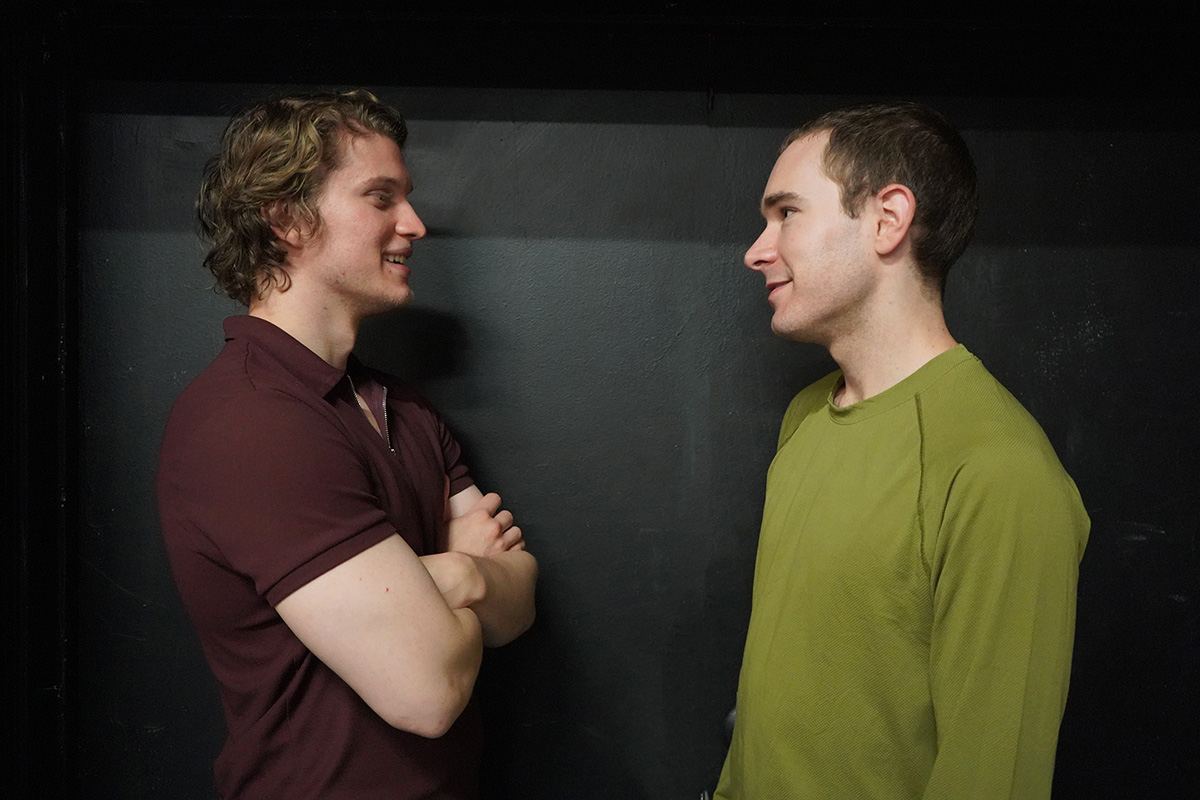
Playwright Samuel D. Hunter has long been attracted to telling stories about people that society often overlooks. So it’s fitting that his play “Clarkston,” getting its West Coast premiere this month from Los Angeles’s Echo Theater digs into the lives of two gay nightshift workers at a small town Costco.
Chris is a frustrated wannabe writer stuck taking care of his meth-addicted mom in the dead-end town of Clarkston, Wash. Jake is a distant relative of the explorer William Clark who’s fled his Connecticut hometown after receiving a fatal medical diagnosis. When they’re assigned to the same night shift in the warehouse, their mutual attraction grows into something more complicated.
For Echo Theater Artistic Director Chris Fields, who is also directing the production, “Clarkston” is a love story about how American consumerism affects our ability to connect.
“Costco for me is a very difficult place. It’s sort of about gross consumerism. You go into Costco and after five minutes, you’re like, ‘There’s nothing wrong with getting 14 steaks,’” Fields says. “I think [Hunter] puts it in there because it’s really a symbol of consumerism and alienation. Now imagine being in Costco at night under the fluorescents, moving pallets of boxes of gargantuan size.”
To prepare himself and his actors to inhabit the lives of Costco workers, Fields says he took his team to the big box store to do on-the-ground research.
“We did a field trip to Costco. We found a warehouse manager, the floor manager, and it’s like, oh, there are people that work here. And you know what? They were great. They were lovely. They couldn’t have been more charming and sweet and helpful.”
Fields says the Costco staff even gave them pallets to use on stage for that extra bit of authenticity.
“I tried to get them to give us a pallet jack, and they were like, ‘uhh …’” he says.
Hunter is best known for his play “The Whale,” which was turned into the Academy Award-winning film of the same name.
But in contrast to the often dreary and miserable tone of that play, Fields says “Clarkston” finds great joy in the lives of its protagonists.
“There’s not only joy in the play, but one of the things that makes it so emotional is these boys get to be gay with each other,” Fields says.
Playing the graveyard-shift lovers are LA Drama Critics Circle Award-winner Michael Sturgis and newcomer Sean Luc Rogers, a recent Yale graduate that Fields expects will make a big splash soon.
“I wouldn’t be surprised if in a couple years he couldn’t work with us because he’s in Vancouver shooting a series for the rest of his life,” he says.
They’re joined by Tasha Ames, fresh off her own LA Drama Critics Circle Award win for last year’s “Do You Feel Anger?”, playing Chris’s drug-addicted mom.
“They’re heartbreakers, you know? They come on stage and their hearts are open,” Fields says.
Fields hopes that despite the enormous struggles the characters are dealing with in “Clarkston,” audiences will leave feeling like there’s light at the end of the tunnel.
“You know, it’s hard. To get a car with gas that costs too much money, you can’t go out to eat anymore because it’s so expensive, we might be electing a fucking dictator in the study.
“It’s hard, and I think what I want them to come away with is that feeling when the good guys win. It can work out and it’s really kind of wonderful to be you, despite the fact that we make messes all the time,” Fields says.
‘Clarkston’ opens Sept 14 and runs Friday, Saturday, and Monday at 8 p.m., and Sunday at 4 p.m. at Atwater Village Theater, 3269 Casitas Ave., Los Angeles. Tickets are available here.
Theater
‘Happy Fall’ presents queer love story in the world of stunt acting
Rogue Artists’ production inspired by real performers’ stories
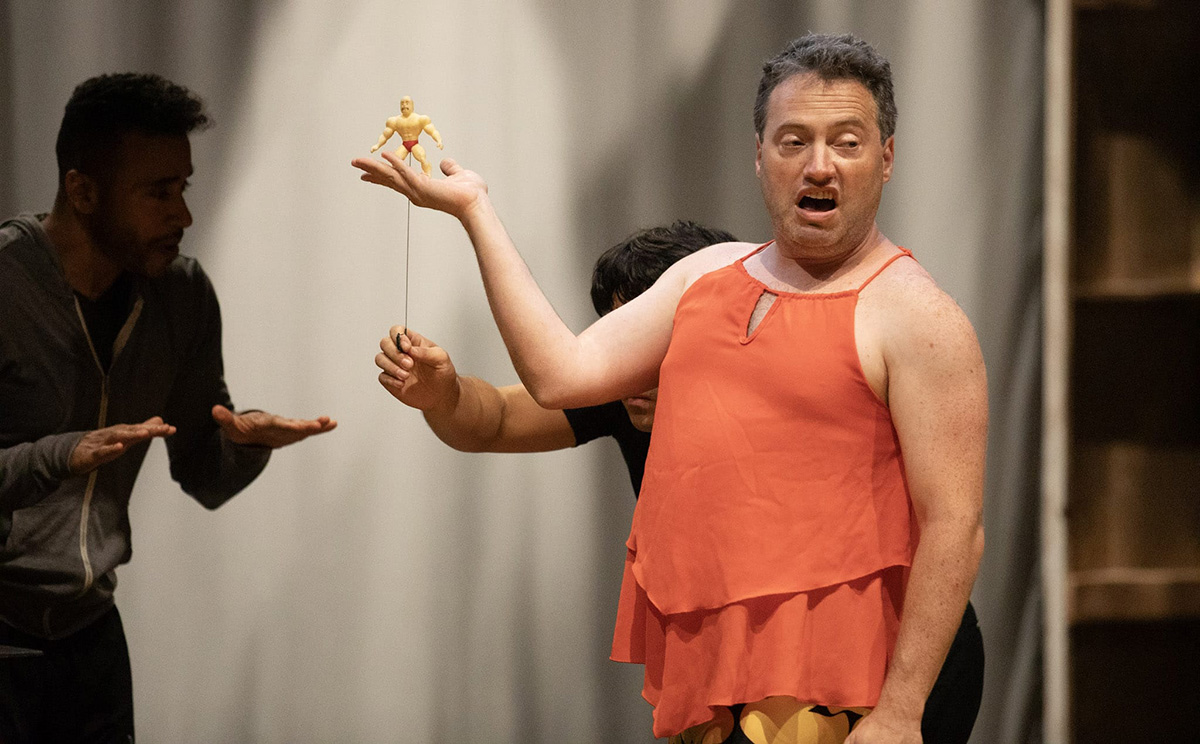
The hyper-masculine world of Hollywood stunt performers might not be the place you’d expect to find queer romance, but Rogue Artists Ensemble Artistic Director Sean Cawelti says he found the idea for his company’s new show, “Happy Fall: A Queer Stunt Spectacular,” among the real-life stories of stunt performers who had to remain closeted on the job.
Cawelti says he fell in love with the world of stunt performance by watching the live stunt shows at Universal Studios as a kid.
“I started researching the stunt community and actually found articles about stunt performers that were wrestling with their identity and their sexuality and how they were treated and mistreated in the industry because of that,” he says.
Based on his idea, Rogue Artists engaged playwright Lisa Sanaye Dring to develop a script inspired by conversations with real stunt performers in the industry.
The result is a multimedia spectacle that aspires to be a true stunt show in the vein of those old Universal Studios shows and a compelling love story about closeted performers.
“The play itself is a stunt show. It has all the things you would expect. It has audience participation, it has really amazing physical performances. And then also there are multiple camera feeds that allow us to create essentially on-the-fly cinematic experiences for the audience so that we can record things and play them back and manipulate them,” Cawelti says.
And the stunts serve as more than mere spectacle – they’re an integral part of building out the love story between aging pro Clay (played by David Ellard) and up-and-comer Felix (played by Kurt Kanazawa).
“Clay represents old school stunt world. He’s been doing this for a long time. His body is starting to get tired and is breaking down, and he loves what he does. His entire identity is baked into this notion of being this kind of invincible action hero. And he is incredibly closeted and has never been able to live fully and authentically in his life,” Cawelti says.
“And Felix, he’s new to Hollywood and is coming to the industry with a real hunger and zest, but also is living more authentically. Felix meets Clay and understands in the coded way that we often can understand that Clay is a part of Felix’s community.”
The play arrives at a timely moment, as stunt performers have been pulled increasingly into the spotlight with the recent Hollywood rom-com “The Fall Guy,” and, for Hollywood insiders, increased attention on stunt issues in the recent SAG contract negotiations and the ongoing debate about whether stunt performances and coordination should be recognized at the Academy Awards.
Cawelti thinks the increasing attention on stunt performances stems from audience disillusionment over Hollywood’s increasing reliance on CGI to sell action.
“Maybe we are fatigued with this kind of CGI superhero cartoon disembodiment that we find in cinema so much. There’s something about seeing a real person do a real thing that feels real to the eye and has a real sense of gravity,” he says.
And, of course, that sense of gravity is amplified when you’re watching real performers on a stage in front of you, a sensation that can’t truly be copied on screen.
“A live stunt show is such an oddly surreal place that makes a really exciting playground for an experience like this,” Cawelti says. “If it was on film, there’s such a distance that’s placed where we can’t actually go into the audience, we can’t actually look at you in the eyes and talk with you and ask you questions about what you’re feeling.”
To enhance that live theatrical experience, Rogue Artists is also offering a series of complementary pre- and post-show events, including talkbacks and workshops.
“We have a really exciting slate of community programming that’s complementing the performance. You can learn stunt performance, you can take a workshop on puppetry, have conversations with the composer,” Cawelti says.
“Happy Fall: A Queer Stunt Spectacular” by Rogue Artists Ensemble plays at Renberg Theatre at the Los Angeles LGBT Center, 1125 N McCadden Place, Aug. 17-Sept. 8, Thursday-Saturday at 8 p.m., Sunday at 3 p.m. Full details and tickets at rogueartists.org.
Theater
Odyssey Theatre’s Design for Living tracks an ever-shifting queer love triangle
Noel Coward’s classic comedy searches for new ways of living

Nearly 100 years before Challengers lit up screens with its teasing story of a bisexual love triangle, Noel Coward scandalized Broadway and London stages with his daring play Design for Living, that challenged norms around monogamy and sexuality with its frank portrayal of a three-way relationship. And now, Odyssey Theatre is bringing the queer classic back to the stage for a summer run from July 6-Aug 25 at the West Los Angeles venue.
Design for Living follows a trio of artists – playwright Leo, painter Otto, and designer Gilda – as they navigate an ever-shifting triangular relationship in the 1930s. It’s full of the characteristic wit that’s made Noel Coward one of the twentieth century’s most-produced comedic playwrights, but the play was considered so scandalous at the time that it the official censor of London theatre banned productions of it for six years.
Coward was inspired to write it by the open and polyamorous relationship of his longtime friends, the Broadway stars Alfred Lunt and Lynne Fontane, with whom he starred in the original Broadway production.
And while polyamory and bisexuality are hardly the taboo topics they were during the Great Depression, director Bart DeLorenzo says open and fluid relationships still challenge many people’s perceptions of propriety.
“I wouldn’t say that’s the last taboo, but it’s unusual. You see people struggling with their families and there are all sorts of heteronormative pressures,” DeLorenzo says. “I do think there are people in the world who aren’t happy themselves and don’t want other people to be happy.
“I don’t know why people want to regulate the intimate details of other people’s lives, but for some reason there’s a desire to do that. And so, I don’t think the issues of this play have really gone away.”
DeLorenzo says the play documents an important point in Coward’s life, shortly after his rise to fame, as he tries to navigate the limited opportunities he had to pursue romance and happiness as a gay man.
“He’s writing it in the 1930s, and he’s had his first bath of success, and I think he’s looking around at the world and trying to figure out what kind of life he wants to live,” De Lorenzo says. “What’s funny about the play is that he will go on to invent a kind of a new family and a new way to live, not exactly like the play but similar. But he had no idea that that’s where he was headed.”
So even though the play is a hilarious comedy, DeLorenzo says it’s still one of the most serious dramatic works Coward wrote.
“I think it’s a look for new models because there should be more choices. There should be more possibilities. And I think it really helps to have models of people who have found other ways to be happy,” he says. “It’s about trying to find a way to live the life that you want to live, even when Society doesn’t appreciate it.”
One luxury this production has over the original Broadway production – and perhaps even over modern Hollywood fare exploring polyamory – is its freedom to bring the homoerotic sides of the polyamory polygon.
“There’s a very sexy and romantic scene between the two men. It’s a very funny scene. But I think it’s a very sexy scene but between them,” DeLorenzo notes of his production. “That’s what’s interesting about the play too. Is that Coward gives the biggest scene in the play to the two men. There’s a very nice seduction of a hetero couple in the piece but in a way, I think the gay couple gets the best romantic scene.”
Design for Living plays at the Odyssey Theatre July 6-Aug 25. 2055 S. Sepulveda Blvd. Los Angeles CA 90025. Tickets $20–$37, Fridays Pay-What-You-Can. OdysseyTheatre.com
Theater
LA’s home for queer performing arts, Highways celebrates 35 years
From the AIDS crisis to today’s trans moral panic, Highways has stood at the vanguard of daring queer expression
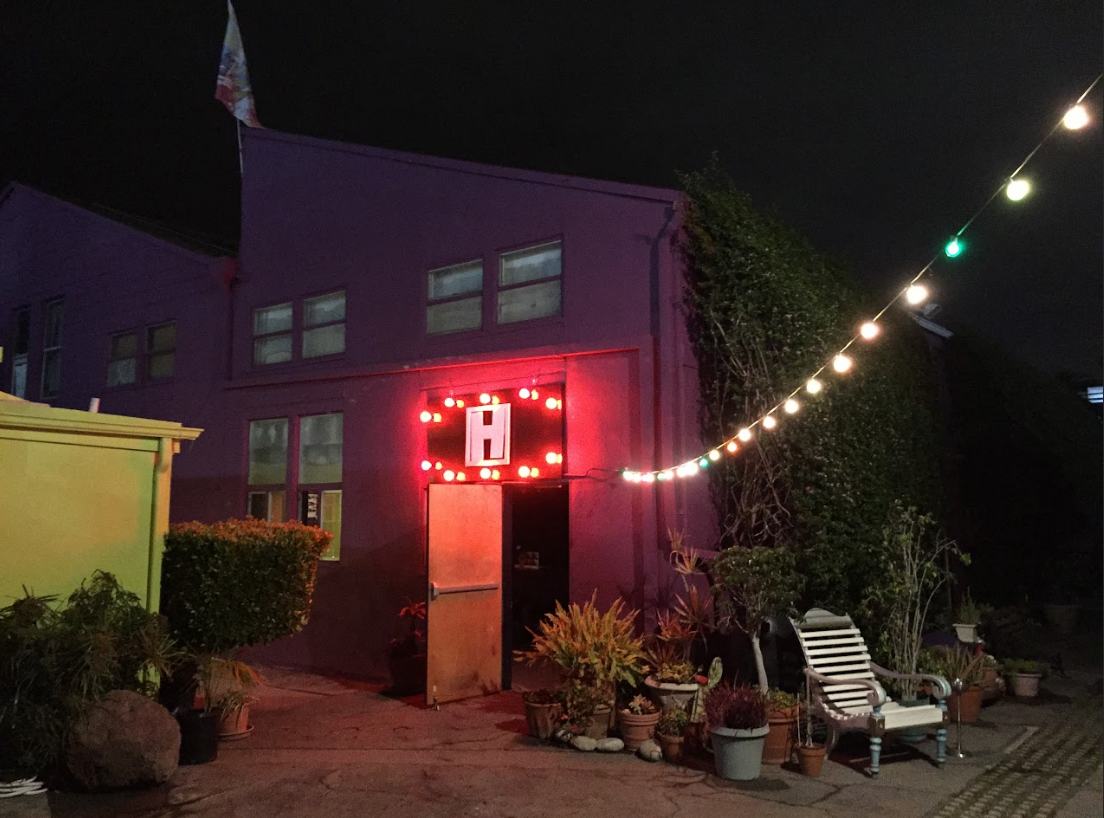
By Rob Salerno | SANTA MONICA, Calif. – For 35 years, Highways Performance Space in Santa Monica has been home to some of America’s most daring and experimental queer performing arts works.
Formed during the peak of the AIDS crisis, Highways was established as a venue where queer work, often ignored, ridiculed, or censored by mainstream arts institutions, could thrive. Given a safe space to experiment and present work that challenged social, political, and cultural norms, generations of queer artists came up through highways and have gone on to become some of the most important names in performing arts.
For Highways’ executive director Leo Garcia, that commitment to producing works that challenge the mainstream has been key to the institution’s long-term success.
“What excites me is our interest in the constant development of new works by artists who work with political, social, psychological, and personal narratives, and the hard work that we bring to make certain that the doors are open to provide access to the artists who are developing these new works and who bring their communities to our space,” Garcia says.
Highways was founded in 1989, amid intersecting crises in the LGBTQ community and the artistic communities in Los Angeles.
“The AIDS pandemic had really surfaced, and… most of the performance places closed and much of the city’s infrastructure had collapsed back then, and that had to do with real estate crunches and bureaucratic red tape and people being able to afford space so work,” Garcia says.
“There was just this recognition that we were in a crucial time politically, and at a sort of a cultural intersection where the performance art that we were creating was suited to the social-psychological-cultural climate.”
Despite the progress the LGBTQ community has made since Highways’ early days, Garcia says the organization is still presenting deeply political works that uplift the community and challenge the status quo.
As an example, he cites trans choreographer Sean Dorsey, whose dance company will headline Highways’ 35th Anniversary Party June 7-8, with a new performance called The Lost Art of Dreaming.
“The reason we’ve brought on Sean Dorsey is I feel that it’s the trans community that is really under attack in this country, and we’re just going to celebrate the beauty of a trans choreographer and their beautiful new work,” he says. “We’re also going to be honoring the Sisters of Perpetual Indulgence, who have been a part of Highways for at least two decades.”
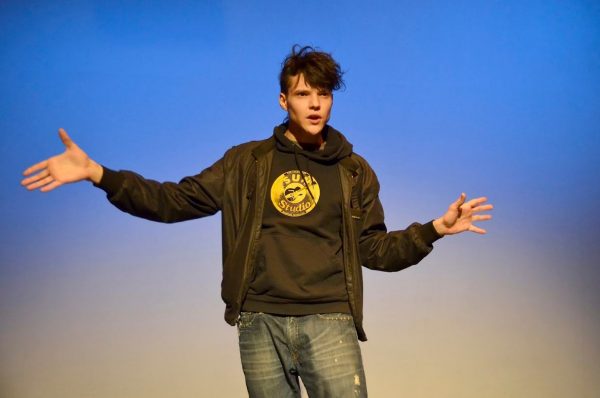
Artistic Director Patrick Kennelly says part of Highways’ success is that it’s constantly seeking out new generations of artists who keep the work fresh.
“So, there’s these different cycles, and it’s interesting now being older to see this fresher group dealing with the similar kinds of stuff that I was when I was starting out in this field 20 years ago,” he says.
Garcia became involved with Highways in 1992, just a few years after it was founded by writer Linda Frye Burnham and performance artist Tim Miller. Garcia says he had just moved to Santa Monica from New York and was just wandering around his new neighborhood when he came upon the theatre.
“There was no one at the door, and I walked in and peeked in the curtain. There were like seven people in the audience, and Annie Sprinkle was doing her show. She was inserting something into her vagina and you could go in and look inside of it. That’s the kind of work they were doing here,” Garcia recalls.
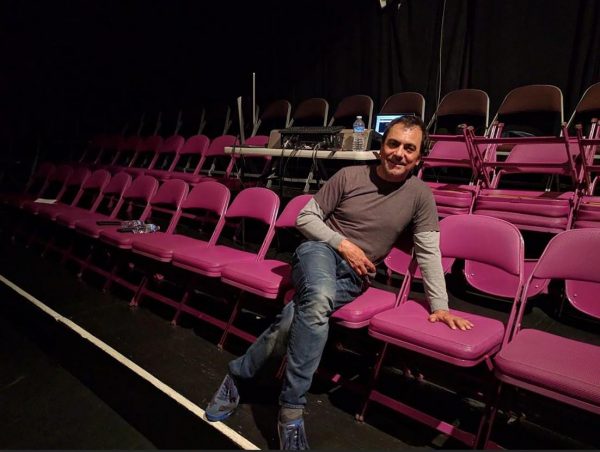
He says he started seeing shows and getting involved with the theatre, until eventually he was asked to come on board as the fiscal manager. He eventually took over as artistic director in 2003, leading the company until he handing artistic duties over to current director Patrick Kennelly.
Kennelly, who’s in his twentieth year working with Highways, first got involved as an intern while studying at CalArts. By that time, Highways had already developed a reputation for discovering and fostering important new artists.
“It was around the same time that there was a big article in the LA Times about the 15th anniversary, and there were names involved that I was familiar with from what I had been studying,” Kennelly says.
Garcia and Kennelly estimate that they’ve helped foster hundreds of artists and shows during their time at Highways – regularly hosting a new show every week, fifty weeks per year.
Over the years, Highways has also expanded its programming to include works by and for other minority and marginalized communities, while still foregrounding work by and for the LGBTQ community.
Among the many artists who’ve come through Highways are Black Lives Matter founder Patrisse Cullors, Pulitzer Prize nominee Kristina Wong, MacArthur Genius Grant recipient Luis Alfaro, and international performance artist Ron Athey. Some artists and collectives from Highways’ earliest days are still presenting works at the venue to this day, including Guillermo Gomez-Pena and the Los Angeles Poverty Department.
“What’s been exciting to me is to discover and or present early works by artists who grow into huge big entities, whether it’s touring the world with their work or getting them huge mainstream platforming,” Garcia says.
As for the future, Garcia and Kennelley say that they see Highways continuing to advance its reputation for experimenting with bold new art forms and developing important, unheard voices.
“I hope that the space can survive another 35 years and continue to support these emerging artists who are experimenting and discovering their process and maybe don’t have the accessibility at that point in their careers for larger shows,” Kennelley says.
“We want to continue to work with the communities that we’re serving and it needs to be a place of alliances and collaborations for all these different cultures and genders and disciplines,” Garcia says.
Highways’ 35th Birthday! will take place June 7-8 at 8:30pm at Highways Performance Space, 1651 18th St, Santa Monica, CA, 90404. Tickets: highwaysperformance.org
Theater
Los Angeles Drama Critics Circle announces 2023 award recipients
The 54th Annual ceremony took place on Monday, April 8, 14 different productions were honored, celebrating a wide range of LA theater
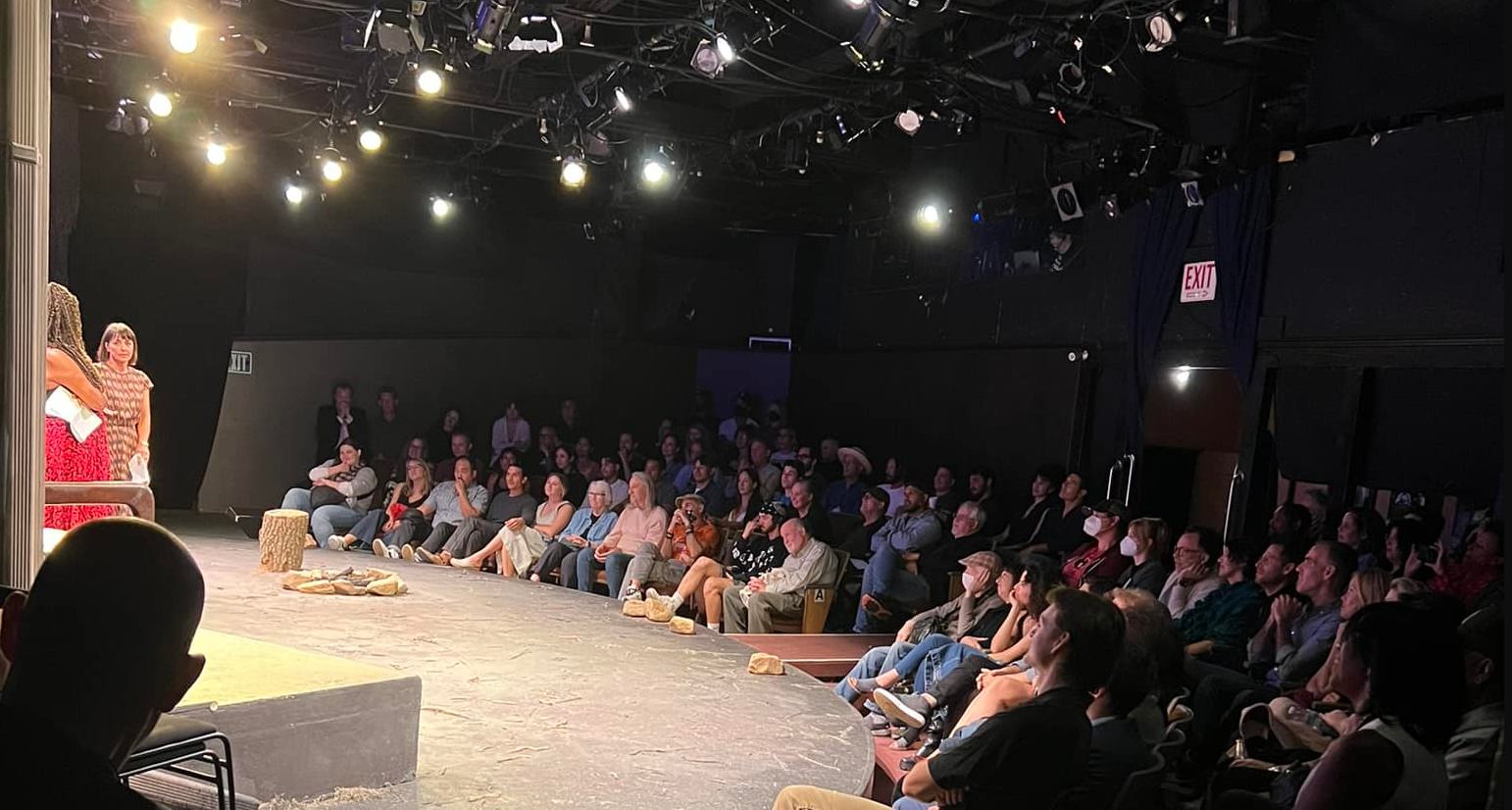
LOS ANGELES – The Los Angeles Drama Critics Circle has announced their award recipients for 2023. Kill Shelter (Theatre of NOTE) received the prestigious Production award, with additional honorees named in 17 other categories. In total, 14 different productions were honored, celebrating a wide range of Los Angeles theater.
Theatre of NOTE’s Kill Shelter and Pasadena Playhouse’s A Little Night Music received the most awards for a single production. Both productions were also factored into Special Awards, with Kill Shelter author Ashley Rose Wellman winning The TED SCHMITT AWARD for the World Premiere of an Outstanding New Play and A Little Night Music being a significant part of The JOEL HIRSCHHORN AWARD for Outstanding Achievement in Musical Theatre winner Pasadena Playhouse’s The Sondheim Celebration.
The 54th Annual ceremony took place on Monday, April 8th at 8 pm PST. For the first time in LADCC history, a presentation was live stream simulcast on both Instagram and Facebook @LADramaCritics. The live replay can still be viewed on the LADCC’s YouTube channel at @ladramacriticscircle3508 or at https://ladramacriticscircle.com/2023-awards/.
As previously announced, the LADCC has named the following Special Award Honorees:The POLLY WARFIELD AWARD for Best Season by a Small to Midsized Theater is given to Rogue Machine: John Perrin Flynn (Producing Artistic Director), Guillermo Cienfuegos (Artistic Director), Elina de Santos (Co-Artistic Director), and Justin Okin (Producing Director).
The GORDON DAVIDSON AWARD for Distinguished Contributions to the Los Angeles Theatrical Community is presented to Joseph Stern.
The JOEL HIRSCHHORN AWARD for Outstanding Achievement in Musical Theatre is presented to Pasadena Playhouse for The Sondheim Celebration.
The MILTON KATSELAS AWARD for Career or Special Achievement in Direction is presented to Michael Michetti.
The KINETIC LIGHTING AWARD for distinguished achievement in theatrical design goes to Pablo Santiago who will receive a cash prize from Kinetic Lighting (https://kineticlighting.com/).
The TED SCHMITT AWARD for the World Premiere of an Outstanding New Play is awarded to Ashley Rose Wellman for Kill Shelter (Theatre of Note). Ms. Wellman will also receive a cash prize from our Schmitt Award sponsor, The Black List (https://blcklst.com/).
The MARGARET HARFORD AWARD for Excellence in Theatre is given to Echo Theater Company, Chris Fields, Founding Artistic Director.
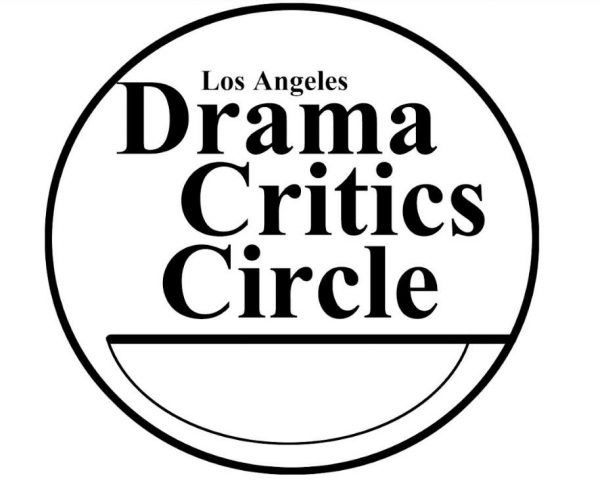
The complete list of award recipients for 2023 is as follows:
PRODUCTION
Kill Shelter; Theatre of NOTE
MCCULLOH AWARD FOR BEST REVIVAL
A Little Night Music; Pasadena Playhouse
DIRECTION
Shaina Rosenthal; Kill Shelter; Theatre of NOTE
WRITING-ORIGINAL Bernardo Cubría; Crabs in a Bucket; Echo Theater Company
Rosie Narasaki; Unrivaled; Playwrights’ Arena and Boston Court Pasadena.
WRITING-ADAPTATION
Aaron Posner; Life Sucks; Interact Theatre Company
MUSIC DIRECTION
Alby Potts; A Little Night Music; Pasadena Playhouse
CHOREOGRAPHY
Joyce Guy; Much Ado About Nothing; A Noise Within
Casey Nicholaw; Mean Girls; Hollywood Pantages Theatre
MUSIC & LYRICS
Michael Shaw Fisher; Exorcistic: The Rock Musical; Orgasmico Theatre Company
LEAD PERFORMANCE
Merle Dandridge; A Little Night Music; Pasadena Playhouse
Edwin Lee Gibson; Fetch Clay, Make Man; Center Theatre Group/Kirk Douglas Theatre
Ashley Romans; Kill Shelter; Theatre of NOTE
FEATURED PERFORMANCE
Tasha Ames; Do You Feel Anger?; Circle X Theatre Co.
Casey Smith; Do You Feel Anger?; Circle X Theatre Co.
ENSEMBLE
Life Sucks; Interact Theatre Company
SCENIC DESIGNAlexander Dodge; The Engagement Party; Geffen Playhouse
LIGHTING DESIGN
Dan Weingarten; The Tempest: An Immersive Experience; The Shakespeare Center LA and After Hours Theatre Company
COSTUME DESIGN
Kate Bergh; A Little Night Music; Pasadena Playhouse
Lou Cranch; Crabs in a Bucket; Echo Theater Company
SOUND DESIGN
Alyssa Ishii; Unrivaled; Playwrights’ Arena and Boston Court Pasadena.
SOLO PERFORMANCE
Daniel K. Isaac; Every Brilliant Thing; Geffen Playhouse
PROJECTION / ANIMATION DESIGN (was missing a comma)
Yee Eun Nam; Twilight: Los Angeles, 1992; Center Theatre Group / Mark Taper Forum
PUPPET DESIGN
Emory Royston; Kill Shelter; Theatre of NOTE
Los Angeles Drama Critics Circle (LADCC) Info: The Los Angeles Drama Critics Circle current officers consist of President Jonas Schwartz-Owen (TheaterMania, BroadwayWorld/LA), Vice President Dana Martin (Stage Raw), Treasurer Hoyt Hilsman (Cultural Daily), Co-Secretaries Martίn Hernández (Stage Raw) and Philip Brandes (Stage Raw, LA Times, Santa Barbara Independent), Website/Social Media Co-Chairs Socks Whitmore (Stage Raw) and Patrick Chavis (LA Theatre Bites, The Orange Curtain Review) and Awards Chair Tracey Paleo (Gia On The Move, BroadwayWorld/LA).
The current 2024 membership of the Los Angeles Drama Critics Circle (in alphabetical order): Lara J. Altunian (Stage Raw, L.A. Dance Chronicle), Philip Brandes (Stage Raw, LA Times, Santa Barbara Independent), Katie Buenneke (Stage Raw, TheaterDigest.substack.com), Patrick Chavis (LA Theatre Bites, The Orange Curtain Review), F. Kathleen Foley (Stage Raw), Anita W. Harris (LATheatrix.com), Martίn Hernández (Stage Raw), Hoyt Hilsman (Cultural Daily), Travis Michael Holder (TicketHoldersLA.com), Deborah Klugman (Stage Raw),
Harker Jones (BroadwayWorld/LA), Dana Martin (Stage Raw), Myron Meisel (Stage Raw), Terry Morgan (Stage Raw, ArtsBeatLA.com), Honorary Member Steven Leigh Morris (Stage Raw), Tracey Paleo (GiaOnTheMove.com/ BroadwayWorld/LA), Melinda Schupmann (ShowMag.com, ArtsInLA.com), Jonas Schwartz-Owen (TheaterMania, BroadwayWorld/LA), Don Shirley (Angeles Stage on Substack), and Socks Whitmore (Stage Raw).
Citation Totals by Production
A Little Night Music; Pasadena Playhouse; 4 wins
Kill Shelter; Theatre of NOTE; 4 wins
Life Sucks; Interact Theatre Company; 2 wins
Crabs in a Bucket; Echo Theater Company; 2 wins
Do You Feel Anger?; Circle X Theatre Co.; 2 wins
Unrivaled; Playwrights’ Arena and Boston Court; 2 wins
The Tempest: An Immersive Experience; The Shakespeare Center LA and After Hours Theatre Company; 1 win
Mean Girls; Hollywood Pantages Theatre; 1 win
Twilight: Los Angeles, 1992; Center Theatre Group / Mark Taper Forum; 1 win
Every Brilliant Thing; Geffen Playhouse; 1 win
Exorcistic: The Rock Musical; Orgasmico Theatre Company; 1 win
Fetch Clay, Make Man; Center Theatre Group/Kirk Douglas Theatre; 1 win
The Engagement Party; Geffen Playhouse; 1 win
Much Ado About Nothing; A Noise Within; 1 win
Citation Totals by Company
Pasadena Playhouse; 4 winsTheatre of NOTE; 4 wins
Center Theatre Group; 2 wins
Interact Theatre Company; 2 wins
Echo Theater Company; 2 wins
Playwrights’ Arena and Boston Court Pasadena.; 2 wins
Circle X Theatre Co.; 2 wins
Geffen Playhouse; 2 wins
The Shakespeare Center LA and After Hours Theatre Company; 1 win
Hollywood Pantages Theatre; 1 win
Orgasmico Theatre Company; 1 win
A Noise Within; 1 win
-
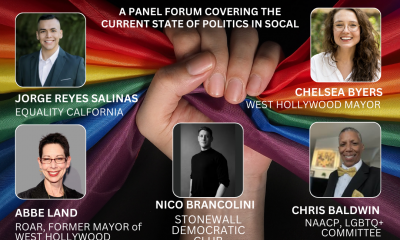
 Features4 days ago
Features4 days agoLos Angeles Blade kicks off Free Community Event Series with an informative political panel of government and advocacy group leaders
-

 a&e features16 hours ago
a&e features16 hours agoMusical Mondays, a mainstay in WeHo nightlife, celebrates 16 years
-
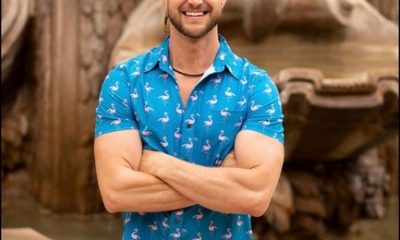
 Features4 days ago
Features4 days agoFinding love in queer Los Angeles with matchmaker Daniel Cooley
-

 Arts & Entertainment4 days ago
Arts & Entertainment4 days agoLA Opera brings back Pride Night with a production of ‘Ainadamar’
-

 Noticias en Español4 days ago
Noticias en Español4 days agoINDIGNACIÓN: ¡El transfeminicidio de Sara Millerey en Colombia nos cuestiona como sociedad!
-
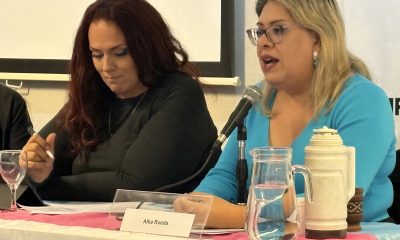
 Argentina4 days ago
Argentina4 days agoArgentina’s transgender community confronts ‘chaotic, desperate’ situation
-

 a&e features9 hours ago
a&e features9 hours agoPeppermint thrives in the spotlight
-

 Myanmar8 hours ago
Myanmar8 hours agoLGBTQ+ advocacy group joins Myanmar earthquake relief effort
-

 Arts & Entertainment6 hours ago
Arts & Entertainment6 hours ago‘Bring it to Brunch’ returns to West Hollywood


